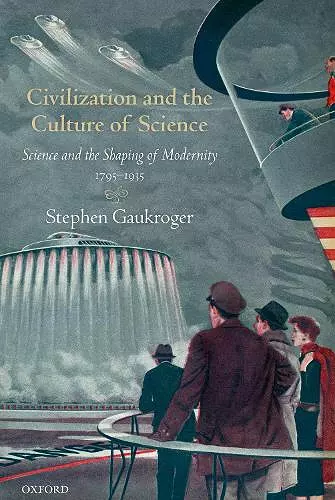Civilization and the Culture of Science
Science and the Shaping of Modernity, 1795-1935
Format:Paperback
Publisher:Oxford University Press
Published:31st Mar '22
Should be back in stock very soon
This paperback is available in another edition too:
- Hardback£59.00(9780198849070)

How did science come to have such a central place in Western culture? How did cognitive values—and subsequently moral, political, and social ones—come to be modelled around scientific values? In Civilization and the Culture of Science, Stephen Gaukroger explores how these values were shaped and how they began, in turn, to shape those of society. The core nineteenth- and twentieth-century development is that in which science comes to take centre stage in determining ideas of civilization, displacing Christianity in this role. Christianity had provided a unifying thread in the study of the world, however, and science had to match this, which it did through the project of the unity of the sciences. The standing of science came to rest or fall on this question, which the book sets out to show in detail is essentially ideological, not something that arose from developments within the sciences, which remained pluralistic and modular. A crucial ingredient in this process was a fundamental rethinking of the relations between science and ethics, economics, philosophy, and engineering. In his engaging description of this transition to a scientific modernity, Gaukroger examines five of the issues which underpinned this shift in detail: changes in the understanding of civilization; the push to unify the sciences; the rise of the idea of the limits of scientific understanding; the concepts of 'applied' and 'popular' science; and the way in which the public was shaped in a scientific image.
This is a remarkable work of scholarship and the fifty-page bibliography is a testament to the author's breadth of knowledge and reading, which forms the scientific basis for his outstanding contribution to the field. * Dr. Arpan K. Banerjee, Hektoen International *
The question the author has set out to answer is, on the face of it, quite simple: How is it that science, utterly marginal in Europe's medieval culture, has become central to our modern culture? It is this very question that, for many a historian but also philosopher or sociologist of science, has stood in the background or even at the forefront of their decision to become one. Yet no one so far has had the courage, and the stamina, and the scholarly experience, and the vast erudition, and the organizing power, and the familiarity with a number of indispensable languages that Stephen Gaukroger displays and that are needed to engage the question on anything like the scale it deserves. . . . there are many reasons for profoundly admiring Gaukroger's achievement. * H. Floris Cohen, Isis *
This is the much-awaited fourth volume of a series, Science and the Shaping of Modernity, that canvasses the history of science with a keen eye to the broader cultural context.... The erudition and dense attention to detail are breathtaking at times. I marvel to think that one scholar could command so much knowledge of the subject, both primary and secondary sources, and bring to bear such sophisticated philosophical judgment. * Margaret Schabas, University of British Columbia *
This is a remarkable work of scholarship and the fifty-page bibliography is a testament to the author's breadth of knowledge and reading, which forms the scientific basis for his outstanding contribution to the field. * Arpan Banerjee, Hektoen International Journal *
ISBN: 9780192866288
Dimensions: 232mm x 153mm x 42mm
Weight: 320g
544 pages